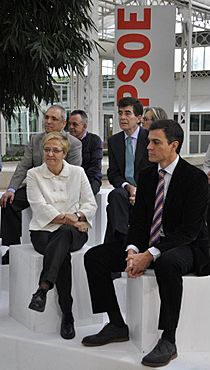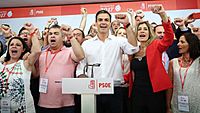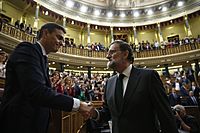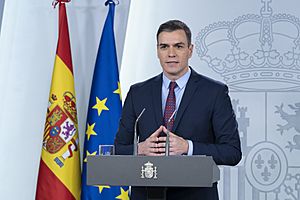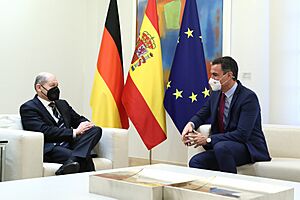Pedro Sánchez facts for kids
Quick facts for kids
The Most Excellent
Pedro Sánchez
|
|
|---|---|
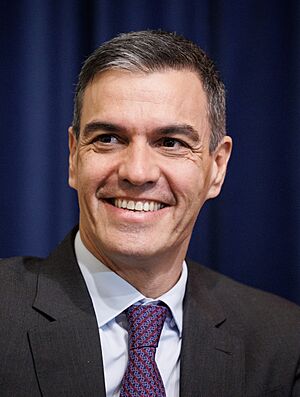
Sánchez in 2024
|
|
| Prime Minister of Spain | |
| Assumed office 2 June 2018 |
|
| Monarch | Felipe VI |
| Deputy | First Deputy Carmen Calvo Nadia Calviño María Jesús Montero Second Deputy Pablo Iglesias Yolanda Díaz Third Deputy Teresa Ribera Sara Aagesen |
| Preceded by | Mariano Rajoy |
| 9th President of the Socialist International | |
| Assumed office 25 November 2022 |
|
| Secretary General | Benedicta Lasi |
| Preceded by | George Papandreou |
| Secretary-General of the Spanish Socialist Workers' Party | |
| Assumed office 17 June 2017 |
|
| President | Cristina Narbona |
| Deputy | Adriana Lastra María Jesús Montero |
| Preceded by | Caretaker committee |
| In office 26 July 2014 – 1 October 2016 |
|
| President | Micaela Navarro |
| Preceded by | Alfredo Pérez Rubalcaba |
| Succeeded by | Caretaker committee |
| Leader of the Opposition | |
| In office 18 June 2017 – 2 June 2018 |
|
| Prime Minister | Mariano Rajoy |
| Preceded by | Vacant |
| Succeeded by | Mariano Rajoy |
| In office 26 July 2014 – 1 October 2016 |
|
| Prime Minister | Mariano Rajoy |
| Preceded by | Alfredo Pérez Rubalcaba |
| Succeeded by | Vacant |
| Member of the Congress of Deputies | |
| Assumed office 21 May 2019 |
|
| Constituency | Madrid |
| In office 10 January 2013 – 29 October 2016 |
|
| Constituency | Madrid |
| In office 15 September 2009 – 27 September 2011 |
|
| Constituency | Madrid |
| Member of the City Council of Madrid | |
| In office 18 May 2004 – 15 September 2009 |
|
| Personal details | |
| Born |
Pedro Sánchez Pérez-Castejón
29 February 1972 Madrid, Spain |
| Political party | Spanish Socialist Workers' Party |
| Spouse |
Begoña Gómez
(m. 2006) |
| Children | 2 |
| Education | Real Centro Universitario Escorial-Maria Christina Complutense University of Madrid Université Libre de Bruxelles IESE Business School Camilo José Cela University |
| Signature |  |
Pedro Sánchez Pérez-Castejón (born 29 February 1972) is a Spanish politician who has been the Prime Minister of Spain since June 2018. He is also the leader, or Secretary-General, of the Spanish Socialist Workers' Party (PSOE). Since 2022, he has also been the president of the Socialist International, a worldwide group of social democratic political parties.
Sánchez started his political journey in 2004 as a city councillor in Madrid. He was later elected to the Congress of Deputies, Spain's main parliament, in 2009. In 2014, he became the leader of the PSOE party and the Leader of the Opposition. This means he was the head of the largest party not in government.
After disagreements within his party, he stepped down as leader in 2016. However, he made a comeback just eight months later when party members voted him back in as leader in 2017.
In 2018, Sánchez became Prime Minister after winning a vote of no confidence against the previous prime minister, Mariano Rajoy. This is a special vote where parliament decides if it still supports the current leader. Since then, he has led his party through several elections, forming governments with other parties to stay in power. He was re-elected as Prime Minister in November 2023 for his third term.
Contents
Early Life and Schooling
Pedro Sánchez was born in 1972 in Madrid, Spain. His father was a public administrator and later owned a business. His mother worked for the government in the social security system and later became a lawyer. He grew up in the Tetuán district of Madrid.
As a teenager, he played basketball for the youth team of CB Estudiantes, a well-known club. In 1993, he joined the PSOE political party. He studied Economics and Business Sciences at a university attached to the Complutense University of Madrid, graduating in 1995.
After finishing his studies, he worked in New York City and later in Brussels for the PSOE's group in the European Parliament. He also worked for the United Nations in Bosnia and Herzegovina. He continued his education, earning more degrees in politics, economics, and business. In 2012, he earned his Doctorate in Economics.
Political Career
Starting in Politics
Sánchez's political career began in 2003 when he ran for the Madrid City Council. He didn't win a seat at first, but he joined the council a year later when two other members left. He also worked as a university lecturer.
In 2009, he became a member of the Spanish Congress of Deputies, which is like the House of Representatives in the United States. He lost his seat in the 2011 election but returned to Congress in 2013 to replace a member who had resigned.
Leader of the Opposition
In 2014, the leader of the PSOE party, Alfredo Pérez Rubalcaba, resigned. Sánchez ran to replace him and won, becoming the new Secretary-General of the party and the official Leader of the Opposition.
As leader, he wanted to make big changes. He called for Spain to become a federal state to help keep regions like Catalonia as part of the country. He also wanted to improve social programs and regain the trust of voters.
The general election in 2015 didn't result in a clear winner. Sánchez tried to form a government with other parties but couldn't get enough support. This led to another election in 2016, where the results were similar.
Resignation and Comeback
After the 2016 election, there was a major disagreement within the PSOE party. Sánchez did not want to allow the rival PP party to form a government, but other important members of his party disagreed. This led to a crisis, and Sánchez resigned as leader in October 2016.
After resigning, Sánchez decided to run for the leadership again. He traveled across Spain in his own car to talk to party members directly. In May 2017, he won the election with over 50% of the vote and became the leader of the PSOE once more.
Prime Minister of Spain (2018–present)
How He Became Prime Minister
In May 2018, the government of Prime Minister Mariano Rajoy was involved in a major controversy. Sánchez and his party, the PSOE, called for a vote of no confidence. This is a special process where the parliament can remove a prime minister if a majority of members vote against them.
Sánchez needed the support of many smaller parties to win the vote. On June 1, 2018, the motion passed, and Rajoy was forced to resign. The next day, King Felipe VI appointed Sánchez as the new Prime Minister of Spain.
First Term as Prime Minister
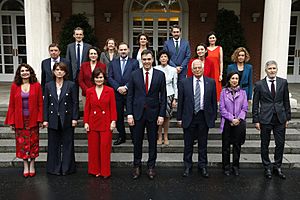
When Sánchez took office, he promised to focus on social issues like unemployment benefits and equal pay for women. One of his government's first major actions was to remove the remains of the former dictator Francisco Franco from a large monument called the Valley of the Fallen. Franco was reburied in a more private cemetery in October 2019.
His first government was a minority government, meaning his party did not have a majority of seats in parliament. This made it difficult to pass laws, and he eventually called a general election in April 2019.
Second Term and Coalition Government
The PSOE won the April 2019 election but still didn't have a majority. After failing to form a government, another election was held in November 2019. This time, Sánchez formed a coalition government with the left-wing party Unidas Podemos. This was the first national coalition government in Spain since the 1970s.
The COVID-19 Pandemic
In March 2020, the COVID-19 pandemic hit Spain hard. Sánchez's government declared a national "state of alarm." This allowed the government to order a nationwide lockdown, where people had to stay home to stop the virus from spreading. It was only the second time a state of alarm had been declared in Spain's recent history.
Foreign Policy
Sánchez has been very active in international politics, especially within the European Union. He is a strong supporter of the EU and believes Spain should play a leading role.
When Russia invaded Ukraine in 2022, Sánchez condemned the invasion and offered Spain's full support to Ukraine. He also offered Spain as a hub for Afghan refugees who had worked with the EU after the fall of Kabul in 2021.
Third Term in Office

In May 2023, the PSOE party did poorly in local and regional elections. In a surprise move, Sánchez called a snap general election for July 2023. Although the rival PP party won the most seats, they couldn't form a government.
Sánchez was able to get support from several other parties, including regional and pro-independence parties. In November 2023, the Congress of Deputies voted to make him Prime Minister for a third term.
During the Gaza war, Sánchez criticized Israel's actions. In May 2024, Spain, along with Ireland and Norway, officially recognized the State of Palestine.
Political Beliefs

Sánchez is a social democrat. He believes in a strong link between social democracy and Europe. He supports the European Green Deal, which aims to make Europe's economy more environmentally friendly. He also supports the idea of a more united, federal European Union.
Sánchez has also stated that he supports legal immigration to help Spain's economy grow and to deal with its aging population.
Personal Life
Sánchez married Begoña Gómez in 2006, and they have two daughters. He is an outspoken atheist.
Besides his native Spanish, Sánchez speaks fluent English and French. He is the first Spanish prime minister to be fluent in English while in office.
Images for kids
-
Sánchez with U.S. President Joe Biden in Madrid, Spain, 28 June 2022
-
Sánchez with Catalonia's President Pere Aragonès in December 2023
-
Sánchez with Israeli President Isaac Herzog and Belgian Prime Minister Alexander De Croo in Jerusalem, Israel, 23 November 2023
-
Sánchez, Ilham Aliyev and António Guterres at COP29 in Baku, Azerbaijan, 12 November 2024
-
Sánchez with Chinese President Xi Jinping in Beijing, China, 11 April 2025
Electoral history
| Election | List | Constituency | List position | Result |
|---|---|---|---|---|
| 2003 Madrid City Council election | PSOE | – | 24th (out of 55) | Not elected |
| 2007 Madrid City Council election | PSOE | – | 15th (out of 57) | Elected |
| 2008 Spanish general election | PSOE | Madrid | 21st (out of 35) | Not elected |
| 2011 Spanish general election | PSOE | Madrid | 11th (out of 36) | Not elected |
| 2015 Spanish general election | PSOE | Madrid | 1st (out of 36) | Elected |
| 2016 Spanish general election | PSOE | Madrid | 1st (out of 36) | Elected |
| April 2019 Spanish general election | PSOE | Madrid | 1st (out of 37) | Elected |
| November 2019 Spanish general election | PSOE | Madrid | 1st (out of 37) | Elected |
| 2023 Spanish general election | PSOE | Madrid | 1st (out of 37) | Elected |
Distinctions
 Bolivia:
Bolivia:
 Chile:
Chile:
- Medal of Salvador Allende (28 August 2018).
 Colombia:
Colombia:
 Italy:
Italy:
 Knight Grand Cross of the Order of Merit of the Italian Republic (16 November 2021).
Knight Grand Cross of the Order of Merit of the Italian Republic (16 November 2021).
 Peru:
Peru:
 Ukraine:
Ukraine:
Notable published works
- Ocaña Orbis, Carlos y Sánchez Pérez-Castejón, Pedro (2013): La nueva diplomacia económica española (The New Spanish Economic Diplomacy). Madrid: Delta. ISBN: 9788415581512.
- Sánchez Pérez-Castejón, Pedro (2019): Manual de resistencia (Manual of Resistance). Madrid: Península. ISBN: 9788499427959.
See also
 In Spanish: Pedro Sánchez para niños
In Spanish: Pedro Sánchez para niños
 | William L. Dawson |
 | W. E. B. Du Bois |
 | Harry Belafonte |


